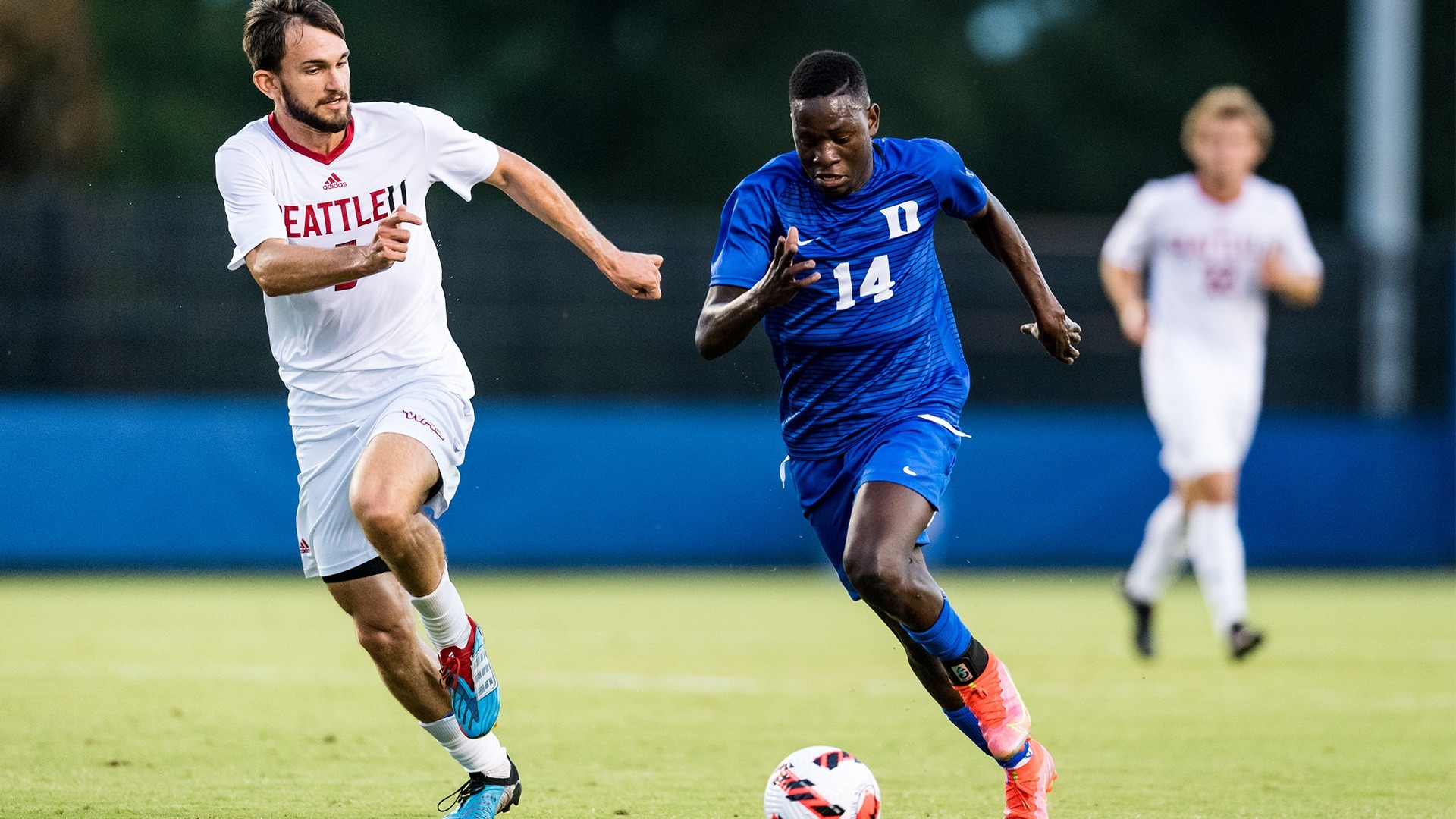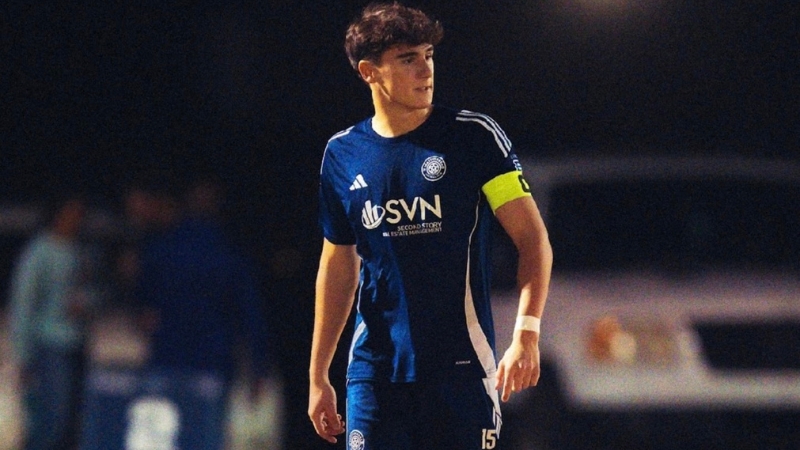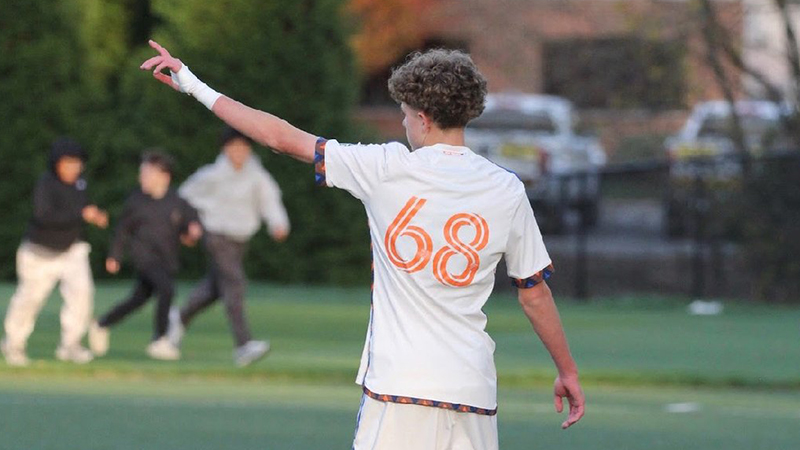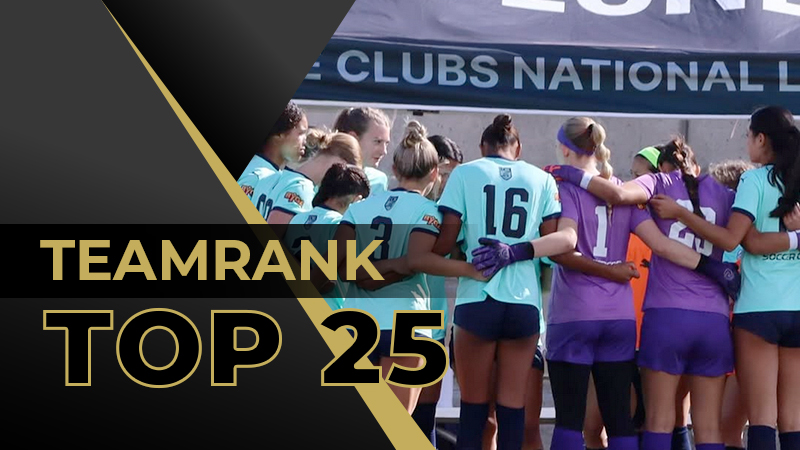African Stars Excel in DI Men's Soccer
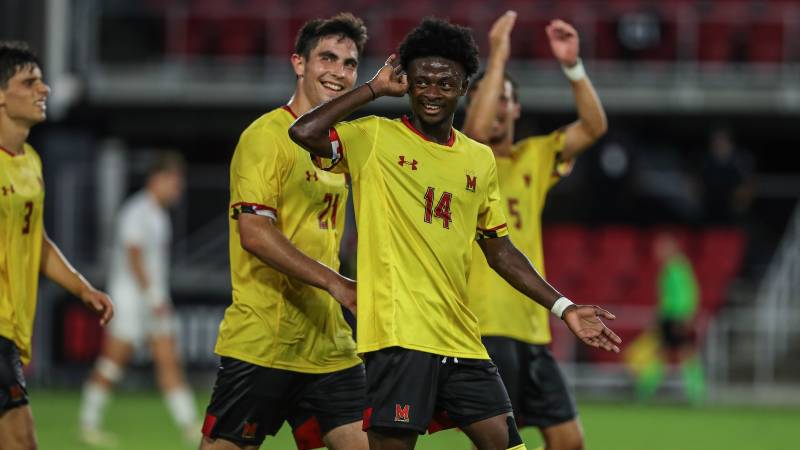
Shak Mohammed recalls being torn between two options. It was 2018, and he had just graduated from Ghana’s prestigious Right to Dream soccer academy. There was, he thought, a chance that he could pursue the professional game in Europe, perhaps follow the path of a few others before him.
Or, he could go to the United States and put his faith in the American system. As many Right to Dream graduates do, he sent messages to alumni and friends abroad, scouting the American system from afar. Within a few weeks, he was on a plane to the US, set to start at the Millbrook Boarding School in New York.
An increasing number of West African football players are making the same transatlantic journey. In the last 10 years, the college game has seen an influx of athletes from a handful of African countries that are taking advantage of the relatively new path into the American system. And now those players, with their distinct backgrounds and tactical nous, have become some of the best in the nation.
“I wanted to maximize my potential,” Mohammed said. “And I thought coming to the US was gonna give me a great opportunity.”
But their stories expand beyond the reach of soccer. These experiences are those of adaptation, the challenges that come with confronting a new culture. Ask Mohammed and his West African counterparts and they will often talk about the connections that have carried them, the relationships they relied upon in order to settle in the States.
“There was already a guy there”
Mohammed had heard of Stanford, but he didn’t really know what it was. But when Right to Dream graduate Ousseni Bouda — now of San Jose — committed to play there, Mohammed knew that something was possible. And Millbrook School could be the start.
“It was perfect because if he’d done it,” Mohammed said. “I thought I could do the same thing.”
The story was the same for Maryland’s Josh Bolma, born in Accra, who made the leap after seeing another player from his Rising Stars Academy make it in the US.
Those familiar faces can make a real difference when players arrive. For Bolma, it was a comfort, as he was able to learn from an old friend at South Kent High School — where he enrolled as a teenager. The same goes for Aboubacar Traore, an Ivorian winger at Charlotte who moved to the US and went straight into college — the first Right to Dream graduate to make the direct leap into the university system.
Although Charlotte didn’t have any players from his high school days, Traore developed a close friendship with the Cameroon-born Jonathan Nyandjo — who helped him settle into the American college system.
“Being with him feels like I'm just with some of my friends back in Africa,” Traore said. “It wasn't really different.”
Bolma found other ways to reconnect, too. Back home, he played jama, a Ghanaian style of percussion. And when he came to the US, that stayed with him, as his soccer teams would sing and dance before they hit the pitch.
“It was just to motivate each other. When we got out there, we're already warmed up and smooth, and we're ready to play” Bolma said.
The fact that South Kent is 100 miles from New York City also helped. The school facilitated trips to the city regularly, giving students the opportunity to take in Broadway shows with African roots or have a meal that reminded them of home — cooked, of course, by Ghanaian chefs.
“It's just totally different”
Mohammed still isn’t really used to the running. Raised in Ghana and developed by the technical coaching style of the Right to Dream academy, the winger quickly became deadly with his feet. Those skills were only further developed by the constant kickabouts in the streets and on the playground. But in the US, he was met by a nearly unrecognizable sport, one defined by sprints and off-ball work. Even his club team, Black Rock FC — which contained some top international talent — molded its players to a more American style of play.
“There were many times where you get the ball and you're like, ‘I’m just tired right now,’” Mohammed said.
Still, for all of those adjustments, Mohammed has enjoyed a successful tenure in the US. The striker has starred for Duke, tallying 10 goal involvements in 18 appearances as a freshman and earning the ACC Freshman of the Year award in the process. He’s been even better his sophomore campaign, with five goals to his name so far, including a crucial header to knock off then-No. 1 Wake Forest.
Bolma has adapted, too. He trained with MLS academies during his tenure at South Kent, forcing him to acclimate to the American game. When it came to college, he flirted with Syracuse, Wake Forest and Duke. But Maryland head coach Sasho Cirovski convinced him to enroll early in Maryland in 2020. And after a successful preseason, he settled into the Terps’ starting XI. Though he didn’t settle into a specific spot in 2021 — Cirovski used him as a winger, wing back and occasionally as an attacking midfielder — his play was enough for a Big Ten Freshman of the year nod. This season, he’s perfected the balance of Ghanain flair with American ruggedness. He now serves as the focal point of Maryland’s dynamic attack — all spins, tricks and neat passes.
Traore impressed Charlotte head coach Kevin Langan immediately. It was the way the ball seemed glued to his feet, his darting movements, his ability to take on a defender.
“He’s an incredible soccer player. He looks like he was born with a ball at his feet,” Charlotte head coach Kevin Langan said. “Now he’s just got to continue to adapt to the American game.”
Traore is in a unique position, with no stopgap of American high school to give him a taste of the game abroad as a teenager. Still, he’s learned well on the job, notching two assists in some impressive minutes for the 49ers.
“I’m slowly getting there”
As these three players have learned, adaptation takes time — both on and off the pitch. And while parts of American culture appeal, others don’t. Mohammed, for example, knows his Chipotle order by heart, but modern American rap isn’t for him. He prefers the afrobeats and reggae he grew up on.
And although there are many cultural differences between the Accra he was raised in and the Durham, North Carolina, where he currently plays, only college soccer can facilitate that kind of cultural blend.
When players like Bolma, Mohammed and Traore make those transatlantic journeys, they adapt to a new system, perhaps becoming better soccer players as a result. And for those academies and the players that represent them, every experience becomes the embodiment of the global game.
Headlines
- Recruiting Roundup: February 2-8
- Professional Signing Tracker: 2025-26
- Tracking Division I Coaching Changes
- 2026 Women's Division I Transfer Tracker
- Winter Boys Club Soccer Player Movement
-
Best U19 Boys Outside of ECNL + MLS Next

- TopDrawerSoccer TeamRank Update - Girls
-
Commitments: Selecting a Service Academy

-
Five Players to Know from U15 BNT Roster

-
Best U17 Boys Outside of ECNL + MLS Next


